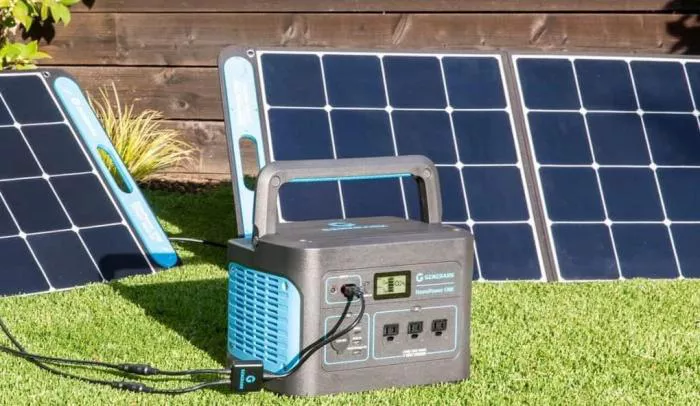When considering a whole house solar generator, understanding the associated costs is crucial for budgeting and making an informed decision. Whole house solar generators are designed to provide comprehensive energy solutions, ensuring that your home remains powered during outages or in off-grid situations. This guide will delve into the various cost factors, components, and potential savings to help you evaluate the financial aspects of investing in a whole house solar generator.
Components and Their Costs
Solar Panels
Solar panels are one of the most significant investments in a solar generator system. They convert sunlight into electrical energy, and their cost is typically measured per watt. High-efficiency solar panels generally cost between $0.70 and $1.00 per watt. For a whole house system, you might need between 20 to 30 panels, depending on your home’s energy consumption and the amount of sunlight your location receives. For a system designed to cover an average household’s energy needs, the total cost for solar panels alone can range from $10,000 to $15,000.
Battery Storage
Battery storage is essential for storing the energy generated by the solar panels. It allows you to use stored energy when sunlight is not available, such as at night or during cloudy days. Lithium-ion batteries are commonly used due to their efficiency and longer lifespan. The cost for battery storage systems can range from $5,000 to $10,000, depending on the capacity and brand. A larger capacity battery will generally cost more but will provide greater energy storage, which is important for ensuring a consistent power supply.
Inverter
The inverter is a critical component that converts the direct current (DC) electricity generated by the solar panels into alternating current (AC) electricity, which is used by most household appliances. The cost of an inverter varies based on its capacity and features. On average, high-quality inverters can cost between $1,000 and $3,000. Choosing an inverter with the appropriate capacity is important to ensure that it can handle the total load of your home’s electrical system.
Installation Costs
Installation is another significant expense associated with a whole house solar generator. Installation costs include labor, permits, and any additional equipment needed to integrate the solar system into your home’s electrical infrastructure. The complexity of the installation and local labor rates will influence the overall cost. On average, installation costs range from $2,000 to $5,000. It is advisable to get multiple quotes from reputable solar installation companies to ensure you receive the best price and service.
Total Cost Estimation
The total cost of a whole house solar generator system can vary widely based on the size and complexity of the system. For an average whole house system, the total cost is typically between $15,000 and $30,000. This estimate includes the cost of solar panels, battery storage, inverters, and installation.
Small to Medium Systems
For smaller homes or those with lower energy requirements, the cost of a whole house solar generator system might fall on the lower end of the spectrum, generally between $15,000 and $20,000. These systems typically include fewer panels and a smaller battery storage capacity, making them suitable for homes with lower energy consumption.
Large Systems
For larger homes or those with higher energy needs, the cost may be on the higher end, ranging from $20,000 to $30,000. These systems generally include a larger number of panels, greater battery storage capacity, and more robust inverters to accommodate the increased energy demand.
Financial Incentives and Savings
Despite the high initial cost, investing in a whole house solar generator can offer various financial incentives and long-term savings. These include:
Tax Credits and Rebates
Many regions offer financial incentives to reduce the cost of installing solar energy systems. In the U.S., the federal Investment Tax Credit (ITC) allows you to deduct a significant percentage of the installation costs from your federal taxes. Additionally, some states and local governments offer rebates and incentives that can further reduce the overall cost.
Energy Savings
One of the primary benefits of a solar generator is the potential reduction in electricity bills. By generating your own power, you can decrease or even eliminate your reliance on the grid, leading to substantial long-term savings. The exact amount saved depends on your energy consumption and local electricity rates.
Increased Property Value
Installing a whole house solar generator can also increase the value of your property. Energy-efficient and sustainable features are attractive to potential buyers, and having a solar system in place can make your home more appealing in the real estate market.
Conclusion
Investing in a whole house solar generator requires careful consideration of the costs and benefits. While the initial investment can be significant, the long-term advantages of energy independence, financial savings, and environmental benefits make it a worthwhile consideration for many homeowners. By understanding the components involved, estimating the total cost, and exploring available financial incentives, you can make an informed decision about whether a whole house solar generator is the right choice for your home.
With proper planning and consideration, a whole house solar generator can provide reliable and sustainable power, enhance your energy resilience, and offer substantial savings over time. Whether you’re motivated by the desire to reduce your carbon footprint, gain energy independence, or benefit from financial incentives, a whole house solar generator represents a valuable investment in your home’s future.

